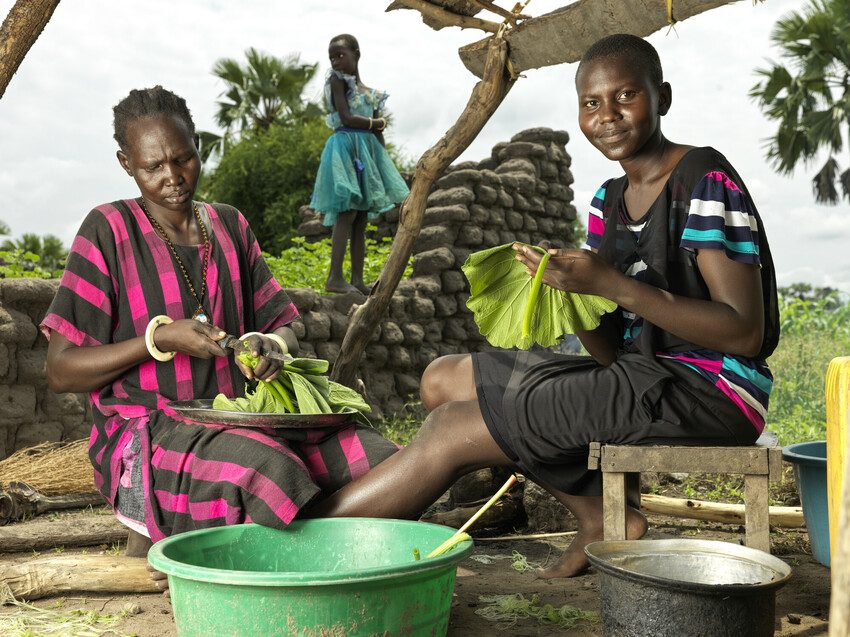We must protect girls’ rights in hunger crisis
16 October 2022Recognising that food is a human right is a vital step in supporting girls affected by the global hunger crisis, global development and humanitarian agency Plan International has said in a new report.

As unprecedented levels of hunger continue to have devastating effects on children, girls and young women, the effects are more wide-ranging than simply hunger – with girls often the first to be taken out of school, the last to eat when food runs low, and vulnerable to early and forced child marriage, child labour, gender-based violence, sexual exploitation and unwanted pregnancy.
“In times of hunger, girls are vulnerable to a number of rights abuses,’ said Plan International Director of Monitoring, Evaluation, Research and Learning, Jacqui Gallinetti. “Thus, a rights-based approach to hunger allows us to address both lack of access to food, and its consequences.”
The right to food is recognised in the 1948 Universal Declaration of Human Rights (UDHR), as part of the right to an adequate standard of living, and is enshrined in the 1966 International Covenant on Economic, Social and Cultural Rights (ICESCR), while the number of countries with a law that provides for the right to food is on the rise.
Addressing hunger is a legally binding human rights obligation
“There is the tendency to portray combating hunger and malnutrition as a moral duty or a policy choice,” said Gallinetti. “Such an approach is not wrong, but also masks the important element that addressing hunger and malnutrition is also a legally binding human rights obligation.
“Child hunger is a degradation of human dignity and therefore a violation of human rights. The elimination of child hunger, using a human rights-based approach helps us to protect and support girls in ways that the needs-based approach doesn’t do on its own.”
Close to 30 countries have written the right to food into their constitutions. It is notable that, among the 38 countries at the emergency phase of food insecurity in 2022, only the Democratic Republic of Congo, Honduras, Kenya and Niger appear on this list.
“However, it is one thing to legislate and another to implement this right,” said Gallinetti. “Though the right to food may be outlined in some countries’ constitutions, this does not mean that the right is always upheld.”
According to a new report by Plan International, Girls’ Rights and the Global Hunger Crisis, hunger and malnutrition are not always caused by lack of food – but a lack of access to available food by large segments of the world’s population, largely because of poverty.
Though more than enough food is produced to feed the global population, as many as 829 million people still go hungry. Six out of 10 people facing acute food insecurity are in countries affected by conflict or insecurity.
The right to adequate food imposes the obligation to respect, to protect and fulfil the right to adequate food and allow humanitarian access, so that providers can deliver food aid cannot be denied, and access to food for affected populations must be rapid, safe and unimpeded.
Similar to other human rights obligations, the right to adequate food imposes the obligation to respect, to protect and fulfil the right to adequate food and allow humanitarian access, so that providers can deliver food aid cannot be denied, and access to food for affected populations must be rapid, safe and unimpeded.
The hunger crisis is only getting worse
The outlook for the remainder of 2022 is even more sobering, as the hunger crisis continues to worsen across many countries. As of September 2022, 970,000 people were facing starvation and death in Ethiopia, Yemen, South Sudan, Somalia and Afghanistan alone.
The effects of climate crisis and COVID-19 are now being compounded by soaring inflation, rising food, energy and fertiliser prices, as well as food shortages due to the ongoing conflict in Ukraine, and nearly 670 million people are projected to still be facing hunger in 2030. This is nearly 8% of the world’s population.
Recent projections suggest that children born in 2020 will likely endure nearly three times the number of droughts and crop failures that their grandparents faced, with children in lower-income countries bearing the burden of the environmental crisis.
“Unless action is taken now, more lives will be lost and the devastating effects on the lives of children, especially girls, will be felt for decades to come,” Gallinetti added. “We must start seeing food as a basic human right that must be upheld.”


